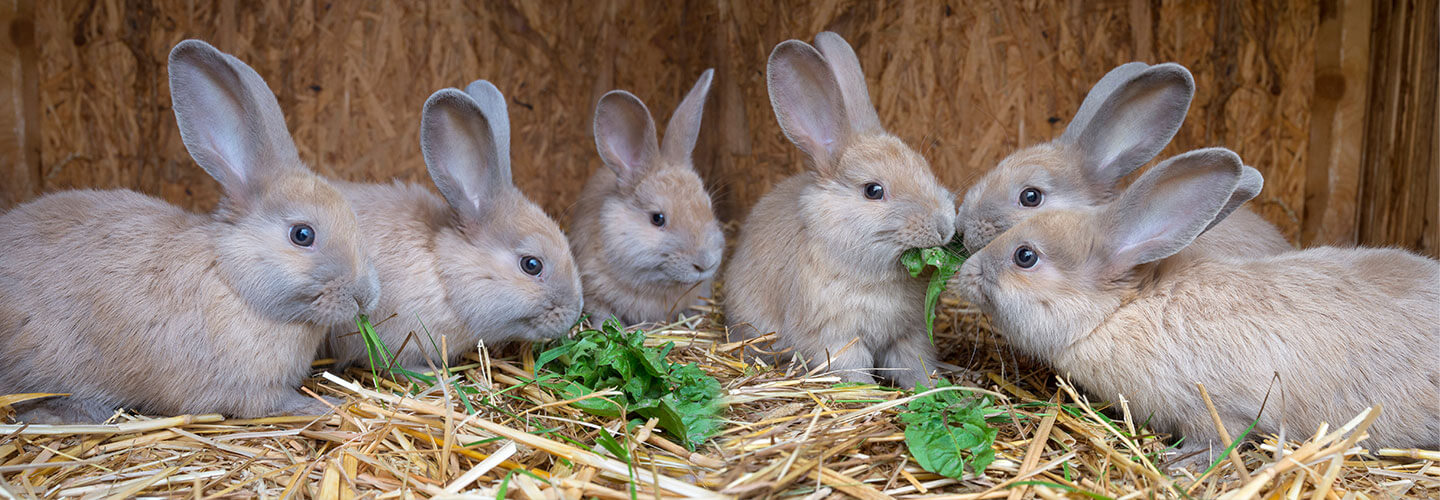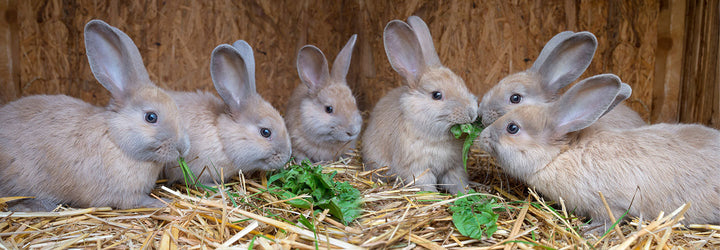

Posted by Emma Oldroyd, on
How To Prevent & Treat Flystrike In Rabbits
Find out how to stop your rabbit suffering from this potentially fatal condition, summer is a key time of year for flystrike.
What is flystrike?
Flystrike is an extremely common, distressing and usually a fatal disease which normally occurs in warmer weather when flies are more active. It most commonly occurs when the rabbit’s rear end becomes soiled with faeces and/or urine. This attracts flies which lay eggs on damaged skin or on the soiled fur. These eggs then hatch into maggots that eat away at the tissues in the surrounding area and release toxins which makes the rabbit unwell.
What are the symptoms of flystrike?
Initially, your rabbit may seem quieter than normal, it’s common for them to also refuse food and drink. Depending on how on set the flystrike is, you may also notice a strong smell coming from their home, as the maggots grow and eat away at the flesh, severe shock sets in so your rabbit may appear to be severely distressed due to the pain.

What to do if my rabbit has flystrike?
We cannot stress enough that flystrike in rabbits is life-threatening, you should contact your local vet straight away if your rabbit is showing signs of having flystrike or if you find a maggot on your rabbit. Rabbits with flystrike can recover, as long as you seek urgent veterinary advice. In treating flystrike, it’s likely your vet will clip and clean your rabbit’s fur as well as administer pain relief and potentially antibiotics to prevent infection. This kind of treatment will be expensive, so prevention is better than cure! In severe cases if extensive tissue loss has occurred, sadly, your rabbit may need to be put to sleep to relieve their suffering.
How to prevent flystrike?
There are a few simple things you can do to help prevent flystrike in your rabbit… Check your rabbit daily! Simply checking on your rabbit every day (several times a day during the warmer summer months) is the easiest way to spot flystrike symptoms, checking your rabbit’s fur and home/bedding area for maggots, ensuring they are cleaning themselves and generally seem like happy bunnies. Digestion problems can lead to diarrhoea which in turn leads to dirty fur, so look out for a soiled back end which will attract maggots. Keep their home environment clean! Ensure your rabbits housing is cleaned DAILY replacing damp or soiled bedding. At least twice a week, totally empty their hutch/room or home and give it a deep clean with a suitable disinfectant, let it dry then apply fresh clean bedding. Try to use a good quality absorbent bedding, we love the Back 2 Nature Small Animal Bedding & Litter.
Use a flystrike prevention spray!
Start to use a flystrike prevention spray in late spring before flies are seen, and pets will have full protective barrier against flies, fleas, lice, and other insect pests and will help to prevent a flystrike outbreak.
Don’t over feed your rabbit!
Some overweight rabbits will find it hard to clean themselves, which can lead to flystrike. But more importantly, if they can’t reach their bottoms they can’t re-ingest caecotrophs – the sticky droppings they need to eat as an essential aid to survival and which helps prevent diarrhoea. Be sure to ask your vet about your rabbits’ ideal weight. Weigh them regularly to ensure they are hitting their weight loss goals, Pets & Friends have free weighing scales to use in all stores! Our fantastic store teams can also offer a wealth advise on a suitable diet for your rabbit. A calorie-controlled rabbit food, such Burgess Excel Light Rabbit Nuggets with Mint is a great option. Remember that good quality hay should make up the majority of your rabbits’ diet and should be available at all times, we stock a great selection from Burgess. Rabbits should also be fed a small amount of leafy greens each day. A traditional hutch should only be seen as your Small Pets “bedroom” and a place to shelter from bad weather. The hutch should be permanently attached to a large run or secure exercise area with your garden, we all know how much rabbits love to jump, hop and frolic around!
Plant herbs to help prevent flystrike!
It’s also worth considering growing plants and herbs that repel flies around your rabbit’s home, plus they will smell amazing in your garden…try planting basil, lavender, lemon thyme, lemon verbena, mint and rosemary. Hopefully these tips will help your rabbits to be happy, healthy and flystrike free!
